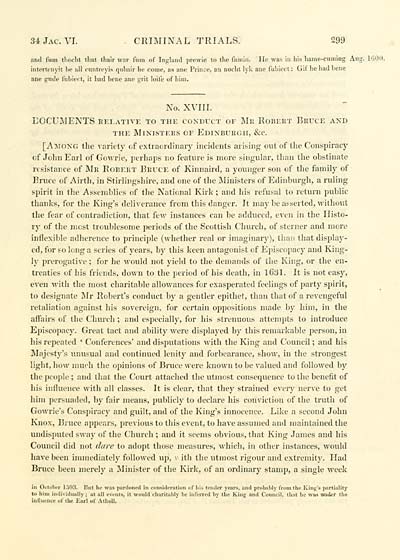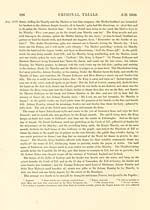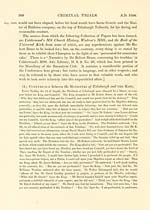Bannatyne Club > Criminal trials in Scotland, from A.D. M.CCCC.LXXXVIII to A.D. M.DC.XXIV, embracing the entire reigns of James IV. and V., Mary Queen of Scots and James VI > Volume 2
(319) Page 299
Download files
Complete book:
Individual page:
Thumbnail gallery: Grid view | List view

34JAC. VI. CRIMINAL TRIALS. 299
ami fiim tlioclit tliat tliair war Ann of Ingliiiul prewie to tlie faiiiiii. Ik- was in liis lianie-cuming Aug. KJOO.
iiitertcnyit be all cuntipyis quliair lie come, as ane Prhue, an noclit lyk ane I'ubicct : Gif lie had bene
ane eriule liibiei t, it had bene ane giit loile of him.
No. XVIII.
LOCUSJENTS KF.I.ATIVE TO THE CONDUCT OF Mil ROBEIIT BrUCE AKD
THE Ministers of Edinburgh, &c.
[Ajiong the variety of extraordinary incidents arising ont of the Conspiracy
of John Earl of Cowrie, perha])s no feature is more singular, than the obstinate
resistance of Mr Robert Bruce of Kinnaird, a younger son of the family of
Bnice of Airth, in Stirlingshire, and one of the Ministers of Edinburgh, a ruling-
spirit in the Assemblies of the National Kirk ; and his refusal to return public
thanks, for tlie King's deliverance from this danger. It may be a.'^serted, without
the fear of contradiction, that few instances can be adduced, even in the Histo-
ry of the most troul)lesome periods of the Scottish Church, of sterner and more
inflexible adherence to princi^jle (whether real or imaginary), than that display-
ed, for so long a series of years, by this keen antagonist of Episcopacy and King-
ly prerogative ; for lie would not yield to the demands of the King, or the en-
treaties of his friends, down to the period of his death, in 1631. It is not easy,
even with the most charitable allowances for exasperated feelings of party spirit,
to designate IMr Robert's conduct by a gentler epithet, than that of a revengeful
retaliation against his sovereign, for certain oppositions made by him, in the
affairs of the Church ; and especially, for his strenuous attempts to introduce
Episcopacy. Great tact and ability were displayed by this remarkable person, in
his repeated ' Conferences' and disputations with the King and Council ; and his
Majesty's unusual and continued lenity and forbearance, show, in the strongest
light, how much the opinions of Bruce were known to be valued and followed by
the people; and that the Court attached the utmost consequence to the benefit of
his influence with all classes. It is clear, that they strained every nerve to get
him persuaded, by fair means, publicly to declare his conviction of the truth of
Gowrie's Conspiracj^ and guilt, and of the King's innocence. Like a second John
Knox, Bruce appears, previous to this event, to have assumed and maintained the
undisputed sway of the Church ; and it seems obvious, that King James and his
Council did not dare to adopt those measures, which, in other instances, would
have been immediately followed up, \' ith the utmost rigour and extremity. Had
Bruce been merely a Minister of the Kirk, of an ordinary stanij), a single week
in Octolier 1593. But he was pardoned in consideration of liis tender years, and probably fi-om the King's partiality
to him individually ; at all events, it would charitably be inferred by the King and Council, that he was under the
influence of the Earl of Atholl.
ami fiim tlioclit tliat tliair war Ann of Ingliiiul prewie to tlie faiiiiii. Ik- was in liis lianie-cuming Aug. KJOO.
iiitertcnyit be all cuntipyis quliair lie come, as ane Prhue, an noclit lyk ane I'ubicct : Gif lie had bene
ane eriule liibiei t, it had bene ane giit loile of him.
No. XVIII.
LOCUSJENTS KF.I.ATIVE TO THE CONDUCT OF Mil ROBEIIT BrUCE AKD
THE Ministers of Edinburgh, &c.
[Ajiong the variety of extraordinary incidents arising ont of the Conspiracy
of John Earl of Cowrie, perha])s no feature is more singular, than the obstinate
resistance of Mr Robert Bruce of Kinnaird, a younger son of the family of
Bnice of Airth, in Stirlingshire, and one of the Ministers of Edinburgh, a ruling-
spirit in the Assemblies of the National Kirk ; and his refusal to return public
thanks, for tlie King's deliverance from this danger. It may be a.'^serted, without
the fear of contradiction, that few instances can be adduced, even in the Histo-
ry of the most troul)lesome periods of the Scottish Church, of sterner and more
inflexible adherence to princi^jle (whether real or imaginary), than that display-
ed, for so long a series of years, by this keen antagonist of Episcopacy and King-
ly prerogative ; for lie would not yield to the demands of the King, or the en-
treaties of his friends, down to the period of his death, in 1631. It is not easy,
even with the most charitable allowances for exasperated feelings of party spirit,
to designate IMr Robert's conduct by a gentler epithet, than that of a revengeful
retaliation against his sovereign, for certain oppositions made by him, in the
affairs of the Church ; and especially, for his strenuous attempts to introduce
Episcopacy. Great tact and ability were displayed by this remarkable person, in
his repeated ' Conferences' and disputations with the King and Council ; and his
Majesty's unusual and continued lenity and forbearance, show, in the strongest
light, how much the opinions of Bruce were known to be valued and followed by
the people; and that the Court attached the utmost consequence to the benefit of
his influence with all classes. It is clear, that they strained every nerve to get
him persuaded, by fair means, publicly to declare his conviction of the truth of
Gowrie's Conspiracj^ and guilt, and of the King's innocence. Like a second John
Knox, Bruce appears, previous to this event, to have assumed and maintained the
undisputed sway of the Church ; and it seems obvious, that King James and his
Council did not dare to adopt those measures, which, in other instances, would
have been immediately followed up, \' ith the utmost rigour and extremity. Had
Bruce been merely a Minister of the Kirk, of an ordinary stanij), a single week
in Octolier 1593. But he was pardoned in consideration of liis tender years, and probably fi-om the King's partiality
to him individually ; at all events, it would charitably be inferred by the King and Council, that he was under the
influence of the Earl of Atholl.
Set display mode to: Large image | Transcription
Images and transcriptions on this page, including medium image downloads, may be used under the Creative Commons Attribution 4.0 International Licence unless otherwise stated. ![]()
| Permanent URL | https://digital.nls.uk/78716632 |
|---|
| Description | Volume second. |
|---|---|
| Attribution and copyright: |
|
| Description | Place of publication Edinburgh unless otherwise stated. No. 125 is relative to but not part of the club's series. |
|---|---|

